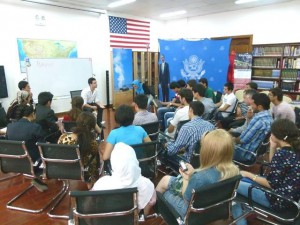
Bryan Furman, 2013-2014, Tajikistan, (in front of class, in white shirt), leading a discussion on the importance of psycho-social support services
I wrote my Fulbright application “knowing” exactly what I would accomplish.
My advisers and I spent months drafting my Statement of Grant Purpose for a Fulbright U.S. Student Award to Tajikistan. I developed a project to apply my advanced Russian and Persian language proficiencies and four years of Central Asia area studies in tracking trends in Tajik foreign policy. Additionally, I secured a placement at the prestigious Tajik Academy of Sciences and made contact with leading Tajik scholars.
These well-laid plans fell apart about two months after starting my grant. In my proposal, I outlined how I would interview government representatives and review official documents to gain unprecedented insight into Tajik foreign affairs. Wishful thinking. Whatever access I expected never came—a problem I attributed to my lack of on-the-ground experience. With my project going nowhere, I felt I had in some way “failed” Fulbright.
Seeing my ideas crumble around me simultaneously humbled and motivated me. Rather than continue looking for opportunities in the realm of international affairs, I decided to draw on my training in psychology. I asked my Tajik friends and colleagues where I might learn more about psychosocial services in Tajikistan to start designing a new project. Contacts at the U.S. Embassy and USAID also provided insight into next steps. I found a partner in Population Services International (PSI), a public health organization working on a USAID HIV/AIDS and TB prevention program.
PSI opened doors to psycho-social service providers and clients. While assisting PSI with program evaluation and site monitoring, I made contacts within communities of injection drug users, sex workers, LGBT persons, and migrant laborers. I quickly developed relationships with NGOs working on these issues, and I spent hours each day conducting interviews, running focus groups, exploring program sites, and reading reports. The contrast between how local organizations and how donors established priorities surprised me, and I concentrated my research on how this mismatch influenced development of the Tajik mental health sector. By allowing my intuition to guide me after acclimating to Tajikistan, I engaged more with Tajik culture and society than I could have with my “armchair academic” project.
The crux of my story boils down to the need for flexibility. Sure, starting from scratch almost two months after arriving in Dushanbe (the capital city) exasperated me. I overcame that frustration, though, and capitalized on the freedom Fulbright provides to think creatively and restructure my grant. Although it may prove less extreme in your situation, what you “know” you will do and what you actually do could differ substantially. My point is not to discourage you from developing a strong application, but rather to remind you of the goal of the Fulbright Program: building mutual understanding between America and your host country. If your proposal or any other part of your plan flops, roll with the punches and consider whether changing your plans might allow you to engage your community more.

2 Comments
HAHA I LOVE how your Fulbright article is here!
Sometimes we need to go through the process of despair in order for us to look into a new direction and finally achieve what we want in the first place. Usually, the new road will give us a new perspective and improve our goals.